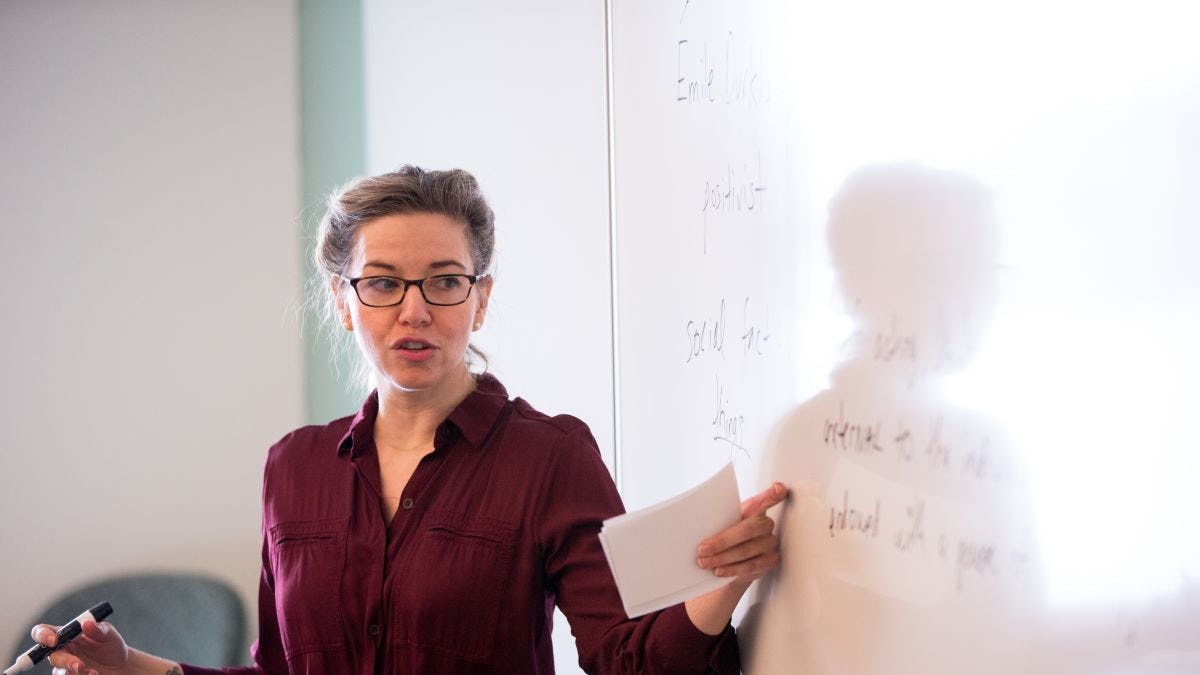
Bachelor's in Science Communication
Program Details
Degree
Bachelor of ArtsAvailable
On campusTell Stories, Share Knowledge, Inspire Action
By bringing together storytelling and scientific insight, Stevens' Science Communication major prepares students to translate complex concepts into clear, compelling narratives for all audiences.
Housed in the School of Humanities, Arts and Social Sciences, this Bachelor of Arts program equips students with the communication tools necessary to bridge the gap between research, the media and the public. Securing positions at leading organizations, graduates are prepared to excel in roles across journalism, public relations, marketing and science policy.
Catalyze Career Success
By exploring how science is communicated across media, policy and public life, students sharpen their writing, speaking and analytical skills. The curriculum emphasizes translating complex scientific concepts for diverse audiences, equipping graduates with the tools to bridge the gap between research and society. Students also develop adaptability and problem-solving skills that prepare them to handle the challenges of a rapidly changing information landscape.
Professional Outcomes
Graduates emerge with the ability to ask critical questions and frame clear, compelling narratives about science, health and technology. Their insight and communication expertise make them highly sought after in journalism, public relations, health communication, education and beyond.
Curriculum Developer, National Center for Disaster Preparedness
Marketing Content Writer, Planet Technologies
Assistant Communications Specialist, Thornton Tomasetti
Ad Sales Assistant, Warner Bros. Discovery
Communications Associate, PwC (PricewaterhouseCoopers)
Internships
Just minutes from New York City, Stevens students have access to top internships in science journalism, nonprofit outreach, healthcare and media. These opportunities provide professional connections and hands-on training in communication that launches careers.
Communications Intern, Prudential Financial
Health Intern, Zeno Group
Public Engagement Intern, Pew Research Center
Continuing Education
Graduates build a strong foundation in both science and communication, positioning them to excel in advanced education. Many pursue graduate and professional programs that deepen their expertise and expand their leadership potential.
Columbia University, M.A. Climate and Society
Catholic University, J.D.
Pennsylvania State University, M.A. Science Communication
Tech-Powered Curriculum
The curriculum teaches how to frame the 21st century's most pressing questions within the history and sociology of science, technology and engineering. Students pursue their passions for inquiry as they develop the next-generation thinking needed to excel in the careers of tomorrow.
What does the four-year study plan entail?
Below is an example of how you might navigate the science communication degree at Stevens. Take a closer look at this sample study plan to see the courses that can shape your academic path.
First Year: Foundations in Critical Inquiry; Intro to Science and Tech Studies; Intro to Political Science; Intro to Science Communication; History of Science and Technology; Calculus for Business and Liberal Arts; Computer Science; Microeconomics
Sophomore Year: Intro to Math Logic; Discrete Mathematics; Images of Science in Literature; Theories of Human Nature; Intro to Sociology; Medical Humanities; Anthropology of Technology; General Electives
Junior Year: Writing and Research Methods; Creative Programming; Social Networking: Marketing; Media Culture and Theory; Environmental Communication; Philosophy of Science; Environmental Ethics; Biological Psychology
Senior Year: Senior Thesis; International Business; Sociology of Science and Tech; Seminar in Science Writing; Environmental Policy; Consumer Behavior; Science Fiction; Rhetoric and Technical Writing
What is a secondary concentration?
Science communication majors often cut across disciplines and pursue complementary coursework in science and engineering. A secondary concentration is comprised of five courses and establishes advanced skills in a scientific, technological, or professional field. Examples of secondary concentrations include:
Marketing
Medical Humanities
Computer Science
Data Visualization
Pre-Law and Public Policy
What is a senior thesis?
The culmination of a student's academic experience at Stevens, the thesis is a significant piece of original research designed and executed under the direction of a faculty advisor. Students contribute to academia’s existing body of knowledge, becoming scholars in their own right.
HASS thesis writers present their findings at the annual Innovation Expo, celebrating their intellectual curiosity and hard work.







